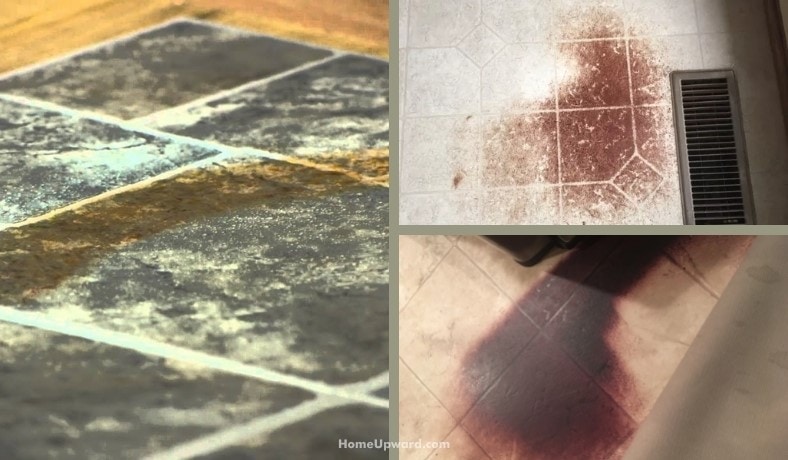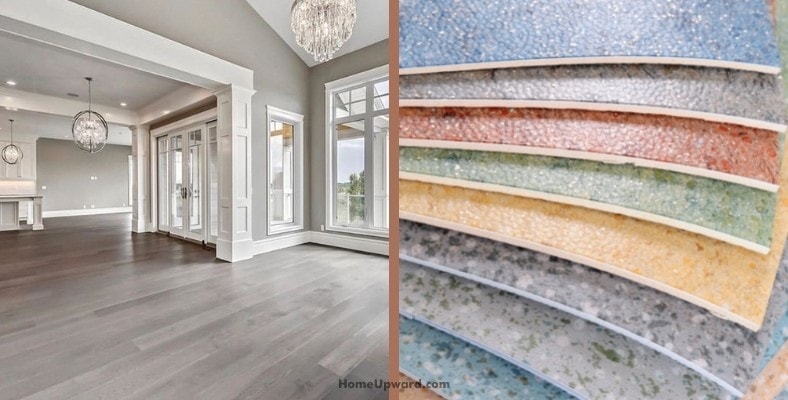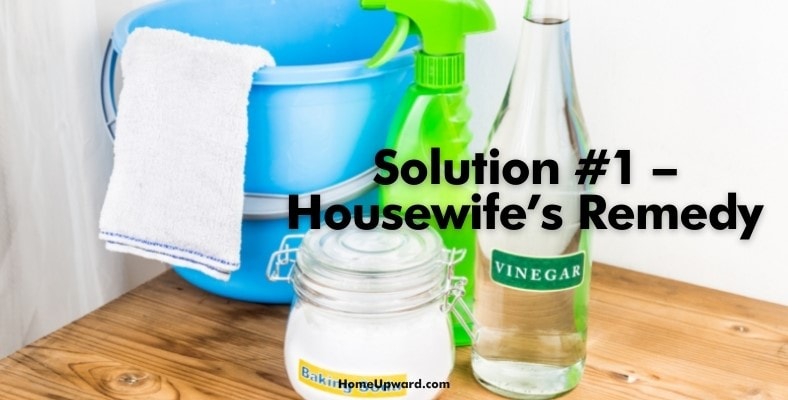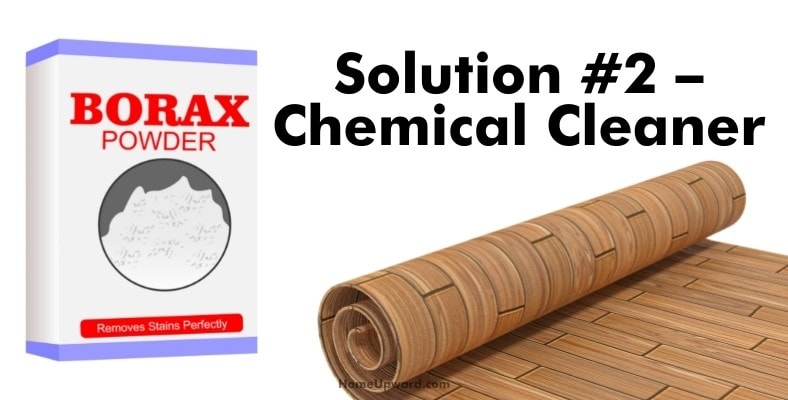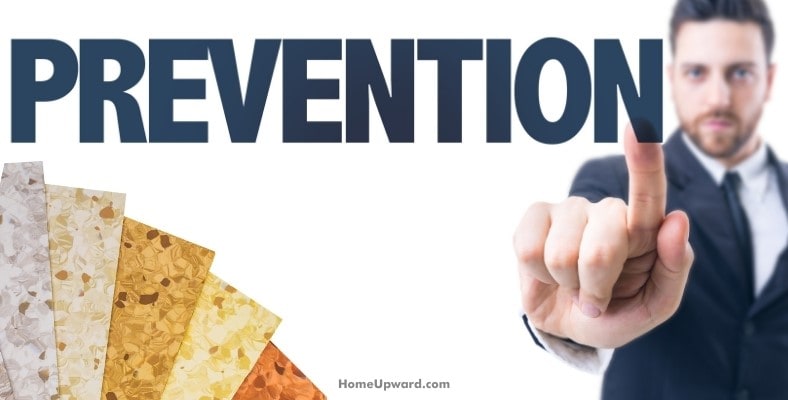If you’ve got vinyl flooring, you can usually get away with the majority of spills and stains as linoleum is a particularly resistant material, which is why it’s so popular in kitchens.
Unfortunately, some stains are a lot more stubborn to remove and it’s harder than simply mopping or using paper towels… and one of those is rust.
Contents
Some cleaning & stain basics to know first
From the legs and feet of metal furniture to the variety of appliances and utilities you’ll find in the average home, it’s easy to cause accidental rust, even just by leaving something metal on the floor on a particularly hot and humid day.
Formed during a reaction between iron and oxygen, those tricky red and brown stains are a blight on most of the surfaces they touch, only made worse by cleaning products that contain bleach, which spread the problem further.
You might be thinking: I’m going to have to spend hundreds of dollars on a professional fix, or at least buy an expensive cleaning remedy from the store. Luckily, there are a few home hacks you can try before you have to spend any money or call for backup.
Prior to trying any of these methods, it’s important that you completely clean the affected area. Not only will this help you focus on the problematic stain as opposed to any other grease and grime, but it also means that nothing will dangerously interact with any chemicals you might need.
Solution #1 – Housewife’s Remedy
Sometimes, the easiest ways to solve problems are the simplest and most affordable. There’s a reason that these remedies and solutions are passed down from generation to generation, and that’s because they work and save you time, effort and money in the process.
You’ll find the necessary ingredients for the following few mixtures in the majority of kitchen cupboards, but you can also pick them up for less than a couple of dollars in total at your nearest convenience or grocery store.
- For the first method, grab yourself a bowl of water, a clean, dry rag, some vinegar and a tub of baking soda, and move away any obstacles so you have full access to the space for thorough scrubbing.
- This is going to get messy, so you might want to take the optional step of putting down some towels or tarps in the surrounding area and making sure you’re wearing clothes that you don’t care about!
- Thoroughly clean the floor to make sure there are no other stains to distract you and ensure there’s nothing that might somehow interact with the cleaning ingredients you’re about to use.
- Coat the rust stain and surrounding affected areas with a layer of baking soda and wait for a few minutes: whilst you do that, slightly dampen your rag with some of the vinegar.
- Now for the fun part – you’re ready to scrub the rust stain for a couple of minutes! Give it some elbow grease and massage the spot, using the bowl of water to rinse and then repeating the process. You’ll notice the mixture fizzes and hisses, due to the reaction taking place.
You might have to do this a couple of times but eventually the baking soda should oxidize the rust stain with the vinegar helping to loosen it up, thus successfully scrubbing away the eyesore.
Why does this combination work? Well, the acetic acid found in vinegar is more than enough to cut through rust, whilst the reaction produced between it and baking soda is also useful at loosening the stain and making it easier to scrub away.
If this method seems to be working but you’re having trouble shifting the stain completely, it could be worth drying the affected area then wiping it with rubbing alcohol before rinsing and trying the baking soda method again.
Found that vinegar isn’t quite doing the job when combined with the baking soda? Give lemon juice a try and make your paste with that instead. Remember you need to be using a non-abrasive sponge or rag to prevent scratching or further damage to the vinyl.
Another option is to leave strong, distilled white vinegar to soak into the affected area for around fifteen minutes to half an hour, then re-applying for a second and even third time if it doesn’t succeed the first time around.
It’s been said that the trick to success with most of these housewife hacks is having the patience to repeat them several times over. That said, if you’ve got yourself a stubborn stain that just doesn’t seem to be budging, then all hope is not lost!
Solution #2 – Chemical Cleaner
If the natural method above does not work, then don’t jump straight to bleach out of sheer desperation. As we said, that will only make your problem worse! The trick is to find a chemical cleaner that actually works on rust stains, which means locating relevant ingredients before you throw it in your cart.
Rust will dissolve should it come into contact with certain acids, but a couple of them are also known to destroy the coating on top of a vinyl flooring as well, so it’s necessary to heed our advice and choose wisely.
You’re aiming for something that clearly states it is a rust remover on the label, but not every product will be obvious. If you’re stuck, try to find a powder that contains oxalic acid, or else just buy some as a standalone powder.
This substance is potentially harmful and can be toxic to humans, so it’s imperative that you follow the manufacturer’s guidelines by wearing gloves, opening a window for ventilation and potentially even wearing a mask.
Another product to try is borax, otherwise known as sodium borate or cream of tartar. Following the same methods as described with the baking powder above, simply apply it to your floor and leave it for 15 to 20 minutes – just make sure you scrub it up well afterwards.
It’s a good idea to test each cleaner you’re going to try on a small fragment of the rust stain, so that they don’t accidentally make the problem worse and waste an entire bottle of something that isn’t going to work. If you’re particularly worried about protecting your floors, you could always test a piece of scrap vinyl first just in case.
Be aware that bleach, abrasives, ammonia and other solvents are all known to damage your vinyl flooring, so it’s important to stick to milder cleaning products where possible, to preserve the quality of your linoleum.
Those who have successfully removed rust from their vinyl recommend Barkeeper’s Friend, WINK (in the detergent aisle) and The Pink Stuff, all of which are known to remove some of the most stubborn stains around.
Once you’re done with these chemical cleaners and solutions, be sure to put them away in a safe place away from animals and children, as they are harmful when ingested and could prove dangerous or even fatal.
How to prevent rust stains on vinyl flooring
The easiest way to deal with rust stains is to avoid having any in the first place!
There are several tips you can bear in mind when you’ve got linoleum, which will help you prevent this unpleasant and unsightly damage:
- Ensure wet clothes, shoes and coats are kept away from vinyl flooring, and that wet people are not traipsing through the areas of the house where it is found on a regular basis
- Regularly clean the vinyl with an appropriate treatment or finish, being sure to dry it thoroughly afterwardsTry not to use metal nails when fitting your linoleum, as these are the primary culprits in rust stains, becoming red and angry very quickly.
- If you can avoid it, don’t spill too much water onto the vinyl – when mopping, be sure to rinse the head thoroughly and don’t allow the floor to become soaked at any point. Damp and rust go hand in hand!
- Keep your faucets turned down when washing dishes or otherwise using the sink, as this will help keep puddles and spills to a minimum
- If you notice any warning signs of rust or see any spillages, clean them up ASAP – build-up happens quite quickly, so staying on top of the floor upkeep is imperative to prevent stains and maintain a nice clean finish
As you can gather, the key to preserving the quality of your linoleum is doing everything in your power to make sure it doesn’t get and stay wet, as well as keeping any metal surfaces in the vicinity bone dry.
It’s impossible to avoid any and all accidents, but not leaving things until the last minute to clean up is only going to be helpful.

